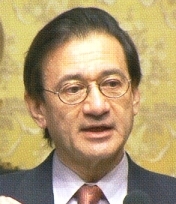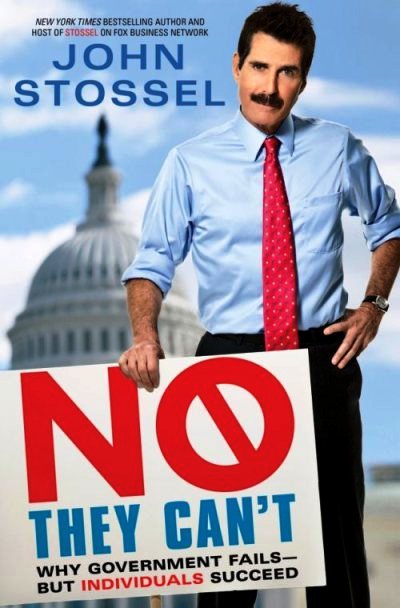![]()
The Words of the Guerra Family
|
|
The Words of the Guerra Family |

Dr. Guerra is a special assistant to Rev. Hyung Jin Moon, international president of the Unification Church.
John Stossel began his career in television as a devotee of Ralph Nader, whom he met at Princeton when Stossel was a student. He went on to win nineteen Emmy Awards during his more than two decades at ABC,' mostly for drawing attention to questionable conduct by corporations. A liberal might ask how such a smart fellow with all the right (that is leftist) instincts ended up so wrong, spouting libertarian ideas like that we're better off keeping government small and keeping laws simple enough that businesses have little to lobby about.
The answer is that Stossel is not only smart but he's honest, and in investigating the consequences of government actions he discerned an unmistakable pattern of more harm than good resulting. Stossel surprised his colleagues at ABC when he reported that following the elimination of the Civil Aeronautics Board'- the predicted disasters did not occur; instead airline competition increased, leading to lower prices for consumers as several local airlines entered the marketplace. Likewise, the elimination of the Interstate Commerce Commission and its control of trucking prices led to lower prices as competing trucking companies were able to set their own prices, resulting in lower prices for consumers on the tens of thousands of items shipped. Stossel was on the road to discovering that with government less is almost always more for people.
Stossel in No, They Can't employs an effective pedagogical device that challenges the unfounded presumptions of big government and people's unwitting affirmation of it. Every few pages, he pronounces "What Intuition tempts us to Believe" vs. "What Reality taught me" such as in "Government can 'get the economy moving again" vs. "Government does not spend money better than individuals do." Not much reflection is necessary to realize that politicians spending other people's money will be less careful than individuals spending their own money. Politicians are concerned with preserving their own power and inevitably end up making many promises while reliably fulfilling only the ones that have some return for them. Healthy economies create productive jobs that increase wealth. Entrepreneurs have to risk their own money and respond to the needs and wants of their customers in a free market system if they are to become successful. State-controlled centralized economies have consistently failed and over-regulated economies sputter along despite governments pumping obscene amounts of money into them as in the case of America under both Bush and Obama. The U.S. government's propping up big business and protecting it from the consequences of bad behavior has not and cannot improve the economy. One more of Stossel's false intuitions vs. reality sums it up: "Government officials act with the public good at heart." vs. "Government officials act in their self- interest just like the rest of us -- but when they do, it's a bigger problem because the government's customers cannot take their business elsewhere." Even more enlightening is his distinction between capitalism and what he calls "crapitalism," where big companies use their influence to manipulate the system.
As government expands, big business spends more and more resources to curry its favor. Reality is counter-intuitive also with respect to government regulation, which incidentally big business often supports because such regulation is much more burdensome for smaller, start-up businesses, which may often offer better deals to the public, than it is for mega corporations.
Big government curtails both free markets and the freedom of individuals.
In turning to health care, Stossel points to the fact that the American government has been interfering with the free market system for most of the twentieth century. Employers began buying health insurance for workers during World War II because government prevented companies from giving workers pay raises, so to reward good workers, health benefits were added. The government further abetted the practice by creating a tax code that treats employer-based health insurance more favorably than coverage individuals buy.

For most of my adult working life, I have received such company health benefits; as a result I have been much less considerate of the cost of health services received than other services or products that I pay for directly. Third-party payment destroys the shopping process that is central to a free market. Companies that offer Health Savings Accounts, where employers put cash into accounts that the worker controls and can draw upon to pay for medical costs, find the employees start asking how much things cost. Workers stopped going to emergency rooms when waking up with a stomachache at night.
From 1965, Medicare became the primary means of paying for health care of the old. Unfortunately, Medicare, which has a $34 trillion unfunded liability, today resembles a Ponzi scheme that has current workers paying for the services of previous workers but is fast approaching the point where it is unsustainable. America is confronting a cataclysmic entitlement crisis brought about by political promises that cannot be fulfilled. Is increasing government control of the health care industry going to improve the quality of care Americans receive? Stossel concludes that patients acting like consumers will not only help control the cost of health care but also improve quality.
Governments' insatiable appetite to control people is no more clearly evidenced than in its campaign to determine what people eat. Although only 10 percent of people need to worry about salt content in food, the Food and Drug Administration (FDA) has introduced a plan to impose legal limits on the amount of salt in thousands of products. The changes, we are told, are to be mandated so that consumers will hardly notice. Stossel rightly asks whether the government and its "food police should be involved in this area of people's lives in the first place.
In New York City, the government launched a public awareness ad campaign against soda because of its sugar content, but the fact is that orange and apples juices contain just as much sugar as Coke. The assumption is that greedy corporations have no interest in the health of consumers who thus need to be protected. Stossel does not argue that corporations operate out of love and goodwill, but points out that when consumers demand it, even fast-food giants like Burger King and McDonalds have introduced healthier choices. Although some people might consider fast food unhealthy, this is not an adequate justification for taking the decision-making power out of the consumer's hands and ceding that decision making control to the government.
The unintended consequence of such government intervention is to slow the more effective self-correcting mechanism of the free market system. Totalitarian regimes assume that their decisions are always the best for all concerned.
Stossel quotes a Los Angeles Times report of four police officers with guns drawn entering without warning a company known as Rawesome Foods to confiscate jugs of raw milk, which some Americans prefer to pasteurized milk.
One critical difference between corporations in a free market system and government is that the former relies on persuasion and reputation while the latter can and does use lethal force.
To be sure, America does not need more laws, whether concerning food or other areas of personal choice, even if it means individuals may sometimes make decisions that will cause themselves harm. Government should not coerce individuals to achieve its concocted ideal of perfection. One intuition that many continue to cling to is that "Public schools are one of the best parts of America," but Stossel retorts that the reality is "Government schools are one of the worst parts of America." The Reading, Math and Science test scores of U.S. K-126 students have remained flat from 1970 to the present. During this time, the inflation-adjusted cost of K-12 public education has doubled. The reason, Stossel says, for the stagnation is not a mystery. K-12 education is a government monopoly and "monopolies don't improve." The current education system is averse to change and does not have the interest of its consumers at its center. Stossel quotes Albert Shanker, the late president of the powerful union, American Federation of Teachers, saying, "When schoolchildren start paying union dues, that's when I'll start representing the interests of schoolchildren." The union-supported system of tenure prevents incompetent teachers from being fired and thus school administrators are powerless to improve the quality of schoolteachers, the most critical factor for student success. With respect to the much maligned charter schools?-70 percent of lottery winners said their school was "excellent" compared to 38 percent of lottery losers. Why a lottery? Because unions and government collude to prevent the opening of an ample number of charter schools to accommodate all the families who wish to enroll their students.
Stossel recalls that when the phone service was effectively a government monopoly "all phones were black and all calls were expensive." Only when there is unfettered competition in providing K-12 education will our children get the education they deserve and need to be contributing members of society.
Resonating with a deep American sentiment when running for the United States presidency, Ronald Reagan promised to "get government off the backs of people." More than thirty years later, Americans are witnessing an unprecedented expansion of government influence and control over virtually every aspect of human life. Confronting extraordinary economic and social challenges, many have been ready to relinquish individual responsibility in the expectation of political salvation. The problem that Stossel has exposed is that in relinquishing such responsibility, we ultimately diminish our freedom and the only capacity to resolve the very problems before us. No central planning committee is smart enough to solve the problems of humanity. Although professing the strongest skepticism regarding big government's ability to improve our world, Stossel strongly affirms that individuals and voluntary networks of private citizens can solve all sorts of problems. That is a time-tested idea that should be given another chance to prove once again its validity.
Unificationists may be disappointed that Stossel is a declared agnostic and leans towards a drastic curtailment of America's military role in the world. I would love for Stossel to have the opportunity to sit together with our international president and discuss theism as the more rational alternative to atheism. Up to this point it seems that Stossel has conversed on the topic only with Christian fundamentalists who believe that God created all things in six literal days. I would be equally delighted if Stossel could enjoy a conversation with the Tongil Foundation chairman [Kook Jin nim] on the topic of the imperative of securing peace and freedom through a strong military.
Both the international president and foundation chairman have been elucidating the founder's vision for Cheon Il Guk over the past few years. Their conclusions, while compatible with Stossel's affirmation of individual freedom and responsibility, lead to a comprehensive manifesto articulating the religious, political and economic dimensions of a truly liberated society.
It would be great if we all had the opportunity to listen to those conversations.